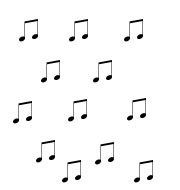Can you identify the verb and adverb in this sentence?
Bronwen happily sang a tune.
The verb (doing word) here is sang and the adverb is happily.

Adverbs of Manner
Happily is an adverb of manner as it tells us how something is done.
How else could Bronwen have sung her tune?
We could have:
Bronwen quietly sang a tune.
Bronwen sang a tune well.
The adverb can appear before or after the verb.
Lots of adverbs of manner end in -ly but as you can see, well doesn’t.

Adverbs of Time
As well as telling us how something is done, adverbs can tell us when something is done.
Bronwen always sang songs.

When did Bronwen sing?
Always
This is an adverb of time as it tells us when the verb is done.
Here are some other adverbs of time:
Never
Yesterday
Often
Soon
Again
Today
Can you put any of these adverbs in our sentence about Bronwen singing?
We could have:
Bronwen never sang songs.
Bronwen sang songs again.

Adverbs of Place
As well as adverbs of manner and time, we can also use adverbs of place.
Adverbs of place tell us where something is done.
Bronwen sang a song outside.
Other adverbs of place include:
Below
Inside
Everywhere
There
Downstairs
Away
Could any of these work in our sentence about Bronwen?
We could have:
Bronwen sang a song downstairs.
Bronwen sang a song inside.
Do you notice that these adverbs of place often come after the verb?
In this activity, you’ll be on the hunt for adverbs of manner, time and place. Good luck.








